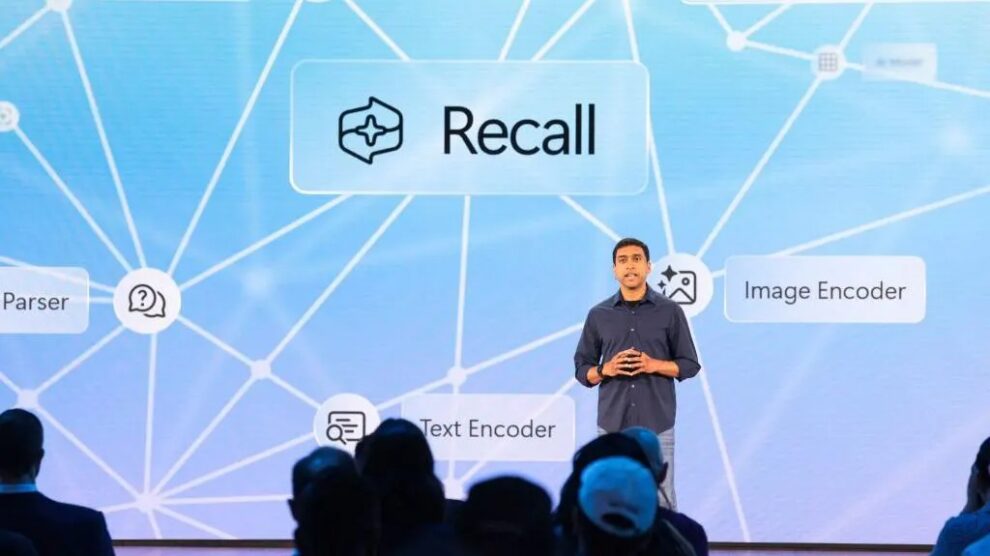Microsoft has announced significant changes to its controversial Recall tool, an AI-powered feature designed to provide users with a “photographic memory” of their PC activities. The revisions come in response to widespread privacy concerns raised when the tool was initially unveiled in May 2024. This development highlights the ongoing challenge tech companies face in balancing innovative AI features with user privacy and data protection.

The Evolution of Recall
Original Concept (May 2024)
- AI-powered tool to access “virtually anything you have ever seen on your PC”
- Took regular screenshots of user activity
- Searched through files, photos, emails, and browsing history
- Turned on by default
Revised Version (Planned for November 2024)
- Opt-in experience
- Encrypted snapshots and associated information
- Biometric login required for access
- Sensitive information (e.g., credit card details) not captured by default
- Available only on CoPilot+ range of laptops with inbuilt AI chips
“Recall is an opt-in experience. Snapshots and any associated information are always encrypted. Windows offers tools to help you control your privacy and customise what gets saved for you to find later.”
Privacy Concerns and Regulatory Scrutiny
The initial announcement of Recall prompted significant backlash from privacy advocates and caught the attention of regulatory bodies:
- Labeled a potential “privacy nightmare” by critics
- UK’s Information Commissioner’s Office (ICO) initiated inquiries
- Launch postponed from June to November 2024
- ICO continues to assess the tool as Microsoft moves toward launch
Technical Aspects and Privacy Measures
Microsoft has implemented several technical measures to address privacy concerns:
- Encryption of all captured data
- Biometric authentication for access
- Exclusion of sensitive information from captures
- Opt-in model replacing the default-on approach
However, some aspects still raise questions:
- “Diagnostic data” may be shared with Microsoft depending on privacy settings
- The extent of data captured and its long-term storage remains unclear
Expert Opinion
Before any functionality like Recall is deployed the security and privacy aspects will need to be comprehensively tested. Personally I would not opt-in until this has been tested in the wild for some time.”
Broader Implications for AI and Privacy
The Recall controversy reflects broader trends and challenges in the tech industry:
- AI Integration in Personal Computing: Increasing use of AI to enhance user experience and productivity
- Data Collection vs. Privacy: Balancing the data needs of AI systems with user privacy
- Regulatory Landscape: Growing scrutiny from data protection authorities on AI-powered features
- User Trust: The importance of transparency and user control in maintaining trust in tech products
- Innovation Challenges: Navigating the fine line between groundbreaking features and privacy concerns
Market Context
Microsoft’s Recall tool is part of a broader trend in the tech industry:
| Company | AI-Powered Feature | Privacy Considerations |
|---|---|---|
| Smart Compose in Gmail | Uses email content for predictions | |
| Apple | On-device Siri processing | Emphasizes local processing for privacy |
| Amazon | Alexa voice recordings | Faced scrutiny over human review of recordings |
Looking Ahead
As Microsoft prepares to launch the revised Recall tool, several key areas will be worth monitoring:
- User adoption rates and feedback on the opt-in model
- Potential further revisions based on real-world usage and privacy audits
- Regulatory responses and potential new guidelines for AI-powered tools
- Impact on Microsoft’s competitive position in the AI-enhanced PC market
- Influence on industry standards for privacy in AI-driven features
Microsoft’s journey with the Recall tool exemplifies the complex challenges tech companies face in the AI era. The initial backlash and subsequent revisions underscore the critical importance of prioritizing user privacy alongside innovation. As AI continues to permeate personal computing, striking the right balance between powerful features and robust privacy protections will be crucial for maintaining user trust and navigating regulatory landscapes.
The revised Recall tool, with its opt-in model and enhanced security measures, represents a step towards more user-centric AI integration. However, its reception upon release and long-term impact on privacy norms in tech remain to be seen. As the industry moves forward, the Recall saga serves as a valuable case study in the ongoing dialogue between technological advancement, user rights, and ethical AI development.
Related Articles:
- AI and Privacy: Navigating the Challenges in 2024
- The Evolution of AI in Personal Computing
- How Data Protection Regulations are Shaping Tech Innovation
External Resources:










Add Comment